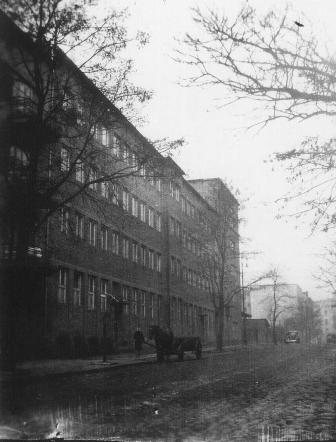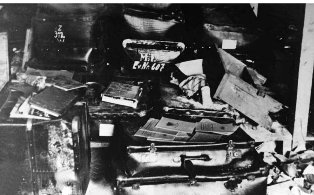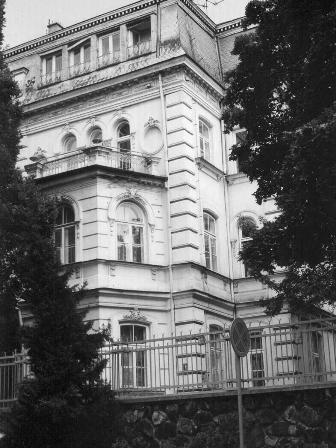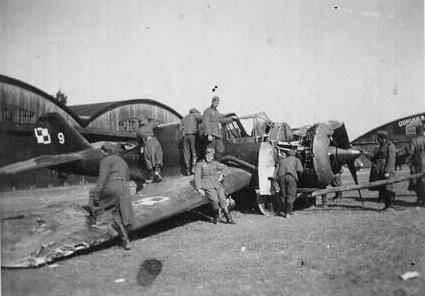Georg Wippern
Georg Wippern was born on 26 May 1909 in Hildesheim and during his service in Lublin was a crucial figure in the
organized plunder of the Jewish victims of “Aktion Reinhard.”
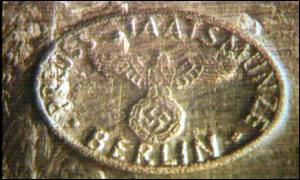
Nazi Gold |
One of his post-war statements illustrates well his role in Lublin during the Second World War:
“In my capacity as leader of the SS- garrison administration (Standortverwaltung) Lublin, I received an order in the spring of 1942 from the leader of the Main Economic Administration in Berlin, Oswald Pohl, to take charge of and sort all the jewellery, valuables and foreign currency and other money confiscated from the Jews and to maintain their correct delivery.
Accumulated jewellery and valuables, as well as foreign currency, were delivered to the Central Economic Administration (WVHA) in Berlin and then to the Reichsbank in Berlin on receipt.
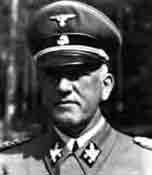
Oswald Pohl |
Jewellery was melted down, if the design was not of special value, and then delivered to the Reichsbank as gold bars. The same applied with the silver. Local currency, Polish Zloty was transferred by my office at the Emissionbank in Lublin to an account at the Reichsbank.”
In the early days of Aktion Reinhard Christian Wirth delivered the confiscated jewellery and valuables from the Jews at Belzec directly to the Reichsbank in an unsatisfactory manner – after the order from Pohl, Wirth had to hand over the valuables to Wippern.
Rudolf Reder described the process at Belzec for transferring the valuables:
“Valuables, money and dollars were taken out of the storehouse each day. The SS-men collected it themselves and put it into suitcases which workers carried to Belzec to the headquarters. A Gestapo officer went first, with Jewish workers carrying the suitcases.
It was not far, only a twenty minute walk to the Belzec station. The camp in Belzec, that is, the torture chamber in Belzec, was under this headquarters. Jews working in administration said that the whole shipment of gold, valuables and money was sent to Lublin, where the main headquarters was, with authority over the Belzec headquarters.”
Wippern’s sorting and processing unit was known as Abteilung Reinhard and Abteilung Iva. Two senior SS-men were assigned to Wippern’s staff Unterscharfuhrer Eicholz and Dorl who worked at different times with a small Jewish workforce between 20-30 people.
The Jewish workforce were involved in the sorting and storing of the high value possessions removed from hundreds and thousands of Jewish families.
In addition Wippern had assigned to him trained banking personnel , SS Obersturmfuhrer Huber, SS-Oberscharfuhrer Teichmann and Rzepa, as well as SS-Unterscharfuhrer Pflanzer.
Wippern’s special depot was located in a large five-storey building at 27 Chopin Street, near the centre of Lublin, items were sorted, cleaned and stored on huge shelves by 20 Jews brought from the nearby Jewish Labour camp on Lipowa Street.
A description of Wippern’s operation is described in the report of SS-Sturmbannfuhrer Albert Franke- Gricksch on a tour of Poland with his superior Max von Herff in May 1943:
"From Trawniki we travelled back to Lublin to inspect the special enterprise Reinhard. This branch has had the task of realising all mobile Jewish property in the Gouvernement Poland.
It is astonishing what immense fortunes the Jews have collected in their ghetto and even ragged and vermin infested dirty little Jews who look like beggars, carry with them, when you strip their clothes off them, foreign currency, pieces of gold, diamonds and other valuables. We wandered through the cellars of this “special enterprise” and we were reminded of the fairy tales of the “Arabian Nights.
Whole boxes full of genuine pearls, cases full of diamonds, a basket full of pieces of gold and many cwts of silver coins, beside jewellery of every kind. In order to carry out a better realisation of all these valuables, the gold and silver are melted into bars.
We inspected the melting process in the garden of the house. There is a small foundry where gold and silver are melted and then formed into bars and then delivered to the German National Bank on certain days. “Special enterprise” Reinhard has so far delivered 2,500 kilos of gold, 20,000 kilos of silver and six and a half kilos of platinum, 60,000 Reichsmarks in currency, 800,000 dollars in money and 144,000 dollars in gold.
The huge quantity of diamonds and pearls can hardly be evaluated. The best proof of the repercussions this enterprise has on the international market is the quotations on the Swiss Stock Exchange and the effects on the international market in diamonds and brilliants. The prices have all gone down and Switzerland could not absorb any more diamonds, because our enterprise has swamped the market.
In this respect alone, the “special enterprise” Reinhard gives us the means for our political struggle and would have a decisive effect on the world market. Apart from other valuables there are 60,000 watches, most of them double –cased watches of high value, very often decorated with diamonds, 800,000 wrist watches and a huge quantity of other small valuables from tobacco and cigarette cases and gold fountain pens and silver bracelets etc.
In special workshops all these treasures are sorted out and examined by specially trained Jews, jewelers, bank clerks and goldsmiths. If necessary the diamonds are broken out in order to separate them and use the metal in a different way.
The wrist watches will be repaired, if necessary and will be handed out to front-line troops. When one goes through the cellar of this special branch it appears like a secret treasure and you get a very different idea of all the things for which people have sacrificed their lives and forgotten, through them the real issues.
You get the right distance from these false values and, even if our eye is delighted by the shine of thousands of brilliants, some of them the size of a pea, for which the old world has paid hundreds of thousands , one recognises a people which saw its whole existence in the heaping up of such treasures.
It is a pleasure to see with what indifference the Oberscharfuhrer registers these valuables as if they were bits of coal or other things of everyday life. The real values of our life which carry us as human beings and as a nation become very clear and more precious still."
The treasure of these people of parasites prove that the age of the power of gold is over and a new time, which has new values, has begun. Wippern’s offices were located in adjoining buildings on the corner of Pilsudski Allee and Lipowa Strasse.
In 1942 he visited Majdanek concentration camp several times, and after each visit he was nervous and overwrought. Wippern also participated in Aktion Reinhard planning meetings which he recalled after the war:
“Furthermore, I remember that I had repeatedly participated at meetings at the office of SS and Police leader Lublin, Odilo Globocnik. I remember for sure that Wirth had also attended those meetings several times. There were at times office leader conferences, where all office leaders of the SS and police took part.
The subjects of the official conference topic discussions I do not remember in particular, but mostly they dealt with general garrison or security matters. Special topics were always discussed in closed circles, because they were subject to official secrecy and also could not be of interest to other departments. I can say here with certainty that at the department leader meetings, where I was present, questions regarding Aktion Reinhard were not dealt with. That applies especially to internal matters.”
The sorting depot at the Old Airfield Camp at Chelmska Street was used as the central clearing depot for the substantial quantities of clothing from the Jewish victims of the Aktion Reinhard death camps, was also under Wippern’s administration.
Wippern was also ordered by Odilo Globocnik to equip the Belzec and Sobibor death camps personnel with uniforms.
Wippern stated that:
“The SSPF Globocnik had already requested from me the fitting out of 40 men who had come from the Reich. At that time nothing had been said about the Jewish resettlement. Globocnik ordered me to fit out these men. They were an SS-Sonderkommando sent from Berlin."
After the war Wippern was employed as a lower grade civil servant. Together with his family they moved often and lived in a number of different towns such as Saarbrucken, Hannover, Aachen, Bad Durrheim, Homburg(Jagerburg) and Bonn.
German investigators questioned him after the war, but no proceedings were commenced and he was never brought to trial. This may have been employed solely as an administrative chief. So a view could be formed that Wippern was a “desk bound” offender.
In spring 1993 Wippern died in Bonn.
Sources:
Hitler’s Man in the East, by Joseph Poprzeczny, published by McFarland & Company, Jefferson North Carolina 2004.
Belzec by Rudolf Reder, published by Panstwowe Muzeum Oswiecm- Brzezinka 1999.
Public Records Office (PRO –Kew)
Holocaust Historical Society
Copyright. Chris Webb & Robert Kuwalek H.E.A.R.T 2007 |


